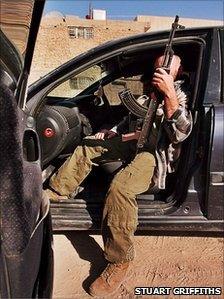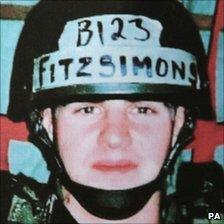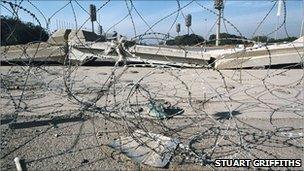The UK private security guards lured to Iraq
- Published

The UK private security industry is worth up to £1bn, officials say
Former soldier-turned-private security guard Danny Fitzsimons has been sentenced to 20 years in an Iraqi jail after being found guilty of murdering two colleagues in Iraq. But for the thousands of private guards still operating there, life remains defined by pressure.
Many of the streets of Iraq are still lawless and dangerous.
Insurgents unleash their guns, mortars and roadside bombs on an almost daily basis, killing several thousand people a year.
The UK's troops have gone and the violence has shifted, with fewer attacks on occupying forces and more among feuding warlords.
But for the thousands of private security contractors still operating in the city, the dangers and pressures remain very real.
Medical assessment
Contractors are mainly paid to protect "assets" - either a person or physical object such as a building - although some are used by the US Army to train Iraqi soldiers and police officers.
Many are former soldiers who have experienced the horrors of war; some have chequered pasts. Now, like mercenary soldiers, their services are available for hire - a new breed of corporate "dogs of war".

Fitzsimons worked as a bodyguard and helped guard convoys
Danny Fitzsimons, from Greater Manchester, was a former paratrooper. The military was in his blood, said colleagues, though others described him as a "loose cannon". He had been working in security for a couple of years.
In August 2009, just days into his contract, he shot dead two ArmorGroup colleagues - fellow Briton Paul McGuigan and Australian Darren Hoare - after the men had been drinking together in Baghdad's Green Zone.
His family say he had been suffering from post-traumatic stress disorder after tours of Kosovo and Iraq.
They also say ArmorGroup took him on without carrying out a full medical assessment.
The company admitted his screening was not completed in line with its procedures but claimed Fitzsimons falsified information during the recruitment process.
Fitzsimons now faces 20 years in jail after he was found guilty of their murder.
He was the first Westerner to be tried by an Iraqi court since the war began in 2003.
It followed the lifting of an immunity deal in 2009 preventing foreign nationals being charged with criminal offences.
The total number of private security contractors in Iraq has fallen from a peak of some 30,000 six years ago to about 10,000.
'Really paranoid'
The British Association of Private Security Companies (BAPSC) estimates there were up to 10,000 British contractors in Iraq in 2005-06, down to about 1,000 now.
BAPSC director general Andrew Bearpark, 57, says the dangers of being shot or hit by a roadside bomb still remain, although they are less severe now.
He said: "If al-Qaeda wanted to disrupt a Shia stronghold, one way might be to attack foreign contractors to destabilise the area. They are still potential targets."
Photographer Stuart Griffiths, 39, who served with the Parachute Regiment for five years, remembers the "chaos" and "camaraderie" during his stint in the capital's Green Zone in 2005.
He worked for a private security firm in a garage, mending and servicing vehicles for other contractors as well as escorting supplies and dropping people off.
He recalled how jumpy other contractors were in the Green Zone, which on one occasion resulted in them turning the sights of their guns on him.
Mr Griffiths, from Hastings in East Sussex, said: "It was a crazy place. I remember going out for a kebab one night. We stopped in the vehicle a bit suddenly and when we got out we were covered in red dots. It was like, 'What's going on here?'
"Everyone was a bit twitchy. You were supposedly in a place that is relatively safe - but everyone was really paranoid, everyone was on edge."
He also said insurgents shot at his vehicle as he dropped clients off at Baghdad International Airport.

Mr Griffiths said the security industry attracted its fair share of "Walter Mitty" characters
In his three-weeks in Baghdad, he saw dozens of people from his military days - most attracted by the money, lack of opportunities in "civvy street" and "nostalgia".
Former SAS soldiers in charge of others would earn about £600 a day, he explained, and ex-soldiers about £150 to £250 a day tax-free - up to seven times a British soldier's wage.
He said: "It is very dangerous and the aftercare is not great. The reality is you're working for a profit-making firm where human life is worth very little compared to an SGV [self-guided vehicle]."
The father of two said anyone, back in 2003, could have become a security contractor, which meant the industry attracted its fair share of "Walter Mittys".
Today the best companies - but by no means all - have stringent vetting procedures, demand medical references and train those with no security background.
But Mr Bearpark, of BAPSC, admits there is a limit to how effective checks can be.
Human rights group War on Want has urged greater regulation in the industry, and says basic training and vetting procedures are not in place.
Campaigns officer Yasmin Khan said the Fitzsimons case highlighted the point.

There are no official figures for the death toll among security contractors
"The case of Danny is a really sad and tragic state of affairs. He is a young man who was obviously ill and put in a dangerous job over there," she told the BBC.
"It demonstrates something we've been saying about private military and the security sector - basic policies and procedures aren't in place."
She called for security contractors to be licensed and on a register, and said voluntary codes of regulation were not worth the paper they were written on.
The UK's coalition government is expected to maintain the same policy as the previous government - self-regulation combined with adopting an international code of conduct.
Chris Kinsey, a security expert and academic at King's College London, said the "premier" security companies do now check the mental state of their employees through psychiatrists.
But he added it was not known how effective these procedures were, and called for more research.
For Mr Griffiths, whose wife was pregnant with their second child while he was in Baghdad, the life of a security contractor lost its attractions.
He decided to leave after hearing a young girl tell her father how much she missed him in a message over the airwaves of a forces radio station.
"I had a real bolt of homesickness and thought 'what am I doing out here?'. I could hear bombs going off in the background."
There are no official figures for the death toll among private security contractors.